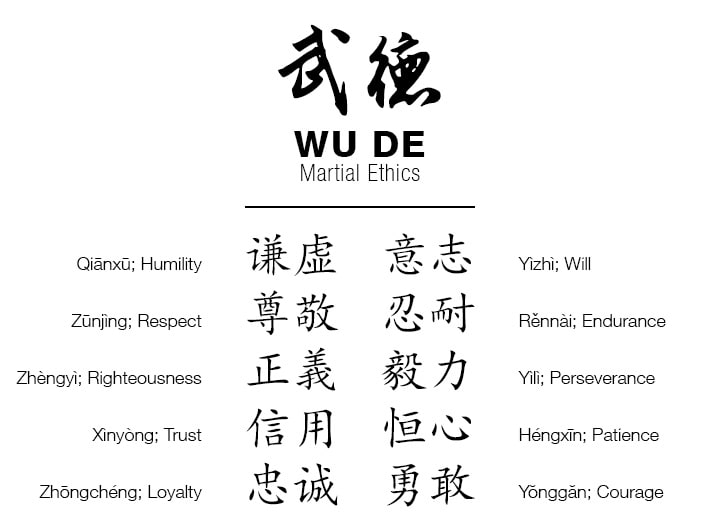What is Martial Morality (武德) and How Can You Apply it in Your Training and Life?
A system of ethics found in Chinese martial arts
While playing any sport, there is good and bad etiquette. Good etiquette would be helping someone up if they fell or shaking hands after a match. Bad etiquette would be the opposite of that such as knocking someone down on purpose or talking trash during a match. Similarly in martial arts, you are expected not to hit your partner as if you wanted to hurt or knock them out. This is considered bad etiquette because it could show that you have a bad temper, care about showing dominance, or have bad blood between you and your partner. To prevent this, you can agree on how hard both of you are going to hit, which is usually 50-70% in order to drill techniques or practice them in a pressure-tested environment. These concepts are practiced today in martial arts to encourage people to have fun learning and help each other on their martial arts journey. These good behaviors that are expected from martial arts practitioners are known as 'martial morality', or wǔ dé (武德) in Chinese, a system of ethics that stems from Chinese martial arts.

What is Martial Morality?
Martial morality is a system of ethics found in Chinese martial arts that stems from the Taoist concept of wisdom and emotion being in harmony with each other. Kung fu practitioners such as the renowned Shaolin monks practiced this concept to supplement their martial arts and spiritual training. There are two aspects of martial morality: Virtue of Deed and Virtue of Mind, which deal with how one is expected to interact with their external environment and self-cultivation of one's mind respectively.

Virtue of Deed
There are five concepts in the Virtue of Deed: Humility, Virtue, Respect, Morality, and Trust. This virtue deals with how one is expected to interact with their external environment and the people around them.
Humility
The act of being humble with one's skills and learning. If you were to be prideful, that means that you are satisfied with your skills and are not willing to learn, thus never improving. Humility means you are in constant pursuit for improvement and you have the potential to learn from anyone you interact with.
Respect
If you do not respect your masters, how will they respect you and be willing to teach you? Self-respect is also included because you cannot start to earnestly respect others if you cannot respect yourself first. If you show both respect and self-respect, you will not just be a great student, but a great friend and human being.
Righteousness
A righteous person does not put off the things they have to do. Inversely, they do not get involved in anything they feel is not the right thing to do. If you master this, you will learn to not regret your actions because it was done out of your good heart and not out of evil influence.
Loyalty
Loyalty is being faithful to your master and friends as well as they to you. Loyalty is being obedient to your master's words and teachings because it is the prerequisite to learning. If you cannot listen to your master, how do you expect them to teach you? Once you realize that you have to get rid of your dignity and be humble, then will the master be willing to teach you.
Trust
To be trustworthy is to not take promises lightly and always seek to fulfill them. Trust is the key to friendship and earns respect. The trust of a friend is hard to gain but easy to lose. You should especially not lie to yourself and trust yourself instead so that once other people can see that you believe in yourself, then they can start trusting you too.

Virtue of Mind
There are five concepts in the virtue of mind: Courage, Patience, Endurance, Perseverance, and Will. This virtue involves self-cultivation of the mind.
Courage
Courage is an aspect which helps you step out of your comfort zone and take action. If you do not have the courage to do what is needed, to step out of your comfort zone, you will never be able to take action when the time call for it. The courage to do things even when you are scared is what separates a novice martial artist and a experience one.
Patience
Good things come to those who wait. Do not be so hasty during a situation or take action whenever you see any openings. If you have patience, you can observe the situation or person and come up with a plan or realize that the best action is to take no action.
Endurance
The ability to endure hardships. There will be times when the only thing you can do is to withstand hard times. There will be times when you cannot involve yourself in the situation or you will make it worse. If you have the strength to bide your time, you will come out a wiser person by the end of it.
Perseverance
This is the ability to keep true to your beliefs no matter how hard it may seem. If you believe in your decision to pursue your passion or promised someone that you will complete a task without fail, perseverance is the key to keep working toward that goal. This way, you will not give up halfway and not regret your decision or the sacrifices you made for that decision.
Will
This is what keeps you striving for your goals in life. It is your ultimate reason for doing the difficult and the seemingly meaningless things. Will is what separates a mentally weak and strong martial artist. If you do not have a strong enough will to achieve or master something, you will likely never complete it or become great at it. This is the same for martial arts and in life, an iron will will make you one step closer or one step greater in your goals. A weak will will stagnate your progress and growth.

How Can You Apply Martial Morality in Your Training and Life?
Ultimately, martial morality is a system of ethics on how to be a good martial artist and human being. When training, listen to your seniors and help your partners learn the skills. Never hurt anyone unless you have to protect yourself or the people you care about and make sure everyone trains in a safe environment. There will be times when people get hurt but that is normal in any sport if they want to improve. In life, it is similar to training martial arts except without the fighting. Have goals, help others with their goals and follow the virtue of mind and virtue of deed because they are the pillars of what makes a successful and most importantly, happy person who will learn to live life without regrets.
Thank you for reading! Did you enjoy learning about martial morality? Which points will you apply in your training and your life? Let me know in the comments about your thoughts!
About the Creator
Tommy Yuen
A budding writer who loves fitness, martial arts, movies, books, shows and more!







Comments
There are no comments for this story
Be the first to respond and start the conversation.